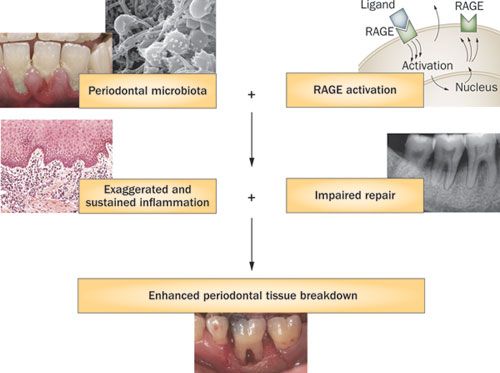Bidirectional association between periodontitis and type 2 diabetes
The recognition of the relationship of periodontal disease to general health, including type 2 diabetes, has revealed new perspectives regarding prevention and treatment.
It may sound strange, but beyond obesity there are other factors that are less well known for risk of type 2 diabetes.
Today I am going to refer to periodontitis as a risk factor for diabetes. And vice versa; because diabetes is also a risk factor for periodontitis.
How can periodontitis and type 2 diabetes be related?
In the article published in Nature “Diabetes mellitus and periodontitis: a tale of two common interrelated diseases”:
Diabetes leads to a hyper-inflammatory response. In these circumstances, the possible repair of the effects of bacterial plaque in the oral cavity is impaired due to the capacity of the receptors and cellular ligands involved in our defenses. Diabetes implies a risk for periodontitis.
- At the same time, periodontitis negatively affects glycemic control in those patients with diabetes and thus contributes to the development of their complications. The adverse effect of periodontal infections on diabetes is explained in principle by increased systemic inflammation, which in some way contributes to insulin resistance. And in this case, it can be concluded that periodontitis is a risk for diabetes.
And then, what can we do?
Patients with uncontrolled diabetes are prone to periodontitis and periodontitis is associated with poorer blood glucose control, which is associated with microvascular complications.
In addition, periodontitis may also contribute to macrovascular complications through systemic inflammation and consequently to problems associated with poorer control of plasma lipids (cholesterol, triglycerides, etc.).  Therefore, periodontitis is a strong predictor of mortality from cardiac or renal complications in patients with diabetes.
Therefore, periodontitis is a strong predictor of mortality from cardiac or renal complications in patients with diabetes.
According to a recent intervention study, regular check-ups with the dentist could be a key element in the effective treatment of type 2 diabetes. In this study it was found that the reduction in glycated hemoglobin among patients with diabetes who received treatment for their periodontitis was like that expected with pharmacological treatment.
Thus, in both, predisposed patients and those who are already diagnosed, a check-up at the dentist is recommended, at least every two years, to carry out an in-depth oral hygiene and remove, if necessary, the bacterial plaque, also called dental or oral biofilm.
Latest posts by Juan Revenga Frauca (see all)
- Obesity recognized as a chronic disease - 13 October, 2021
- Who said you have to eat everything? - 7 October, 2021
- Diabetes and Alzheimer - 29 January, 2021




 Diabetes leads to a hyper-inflammatory response. In these circumstances, the possible repair of the effects of bacterial plaque in the oral cavity is impaired due to the capacity of the receptors and cellular ligands involved in our defenses. Diabetes implies a risk for periodontitis.
Diabetes leads to a hyper-inflammatory response. In these circumstances, the possible repair of the effects of bacterial plaque in the oral cavity is impaired due to the capacity of the receptors and cellular ligands involved in our defenses. Diabetes implies a risk for periodontitis.



